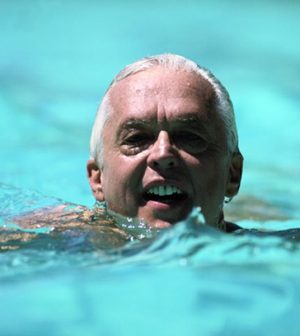- Could Your Grocery Store Meat Be Causing Recurring UTIs?
- Are You Making This Expensive Thermostat Error This Winter?
- Recognizing the Signs of Hypothyroidism
- 10 Strategies to Overcome Insomnia
- Could Artificial Sweeteners Be Aging the Brain Faster?
- Techniques for Soothing Your Nervous System
- Does the Water in Your House Smell Funny? Here’s Why
- Can a Daily Dose of Apple Cider Vinegar Actually Aid Weight Loss?
- 6 Health Beverages That Can Actually Spike Your Blood Sugar
- Treatment Options for Social Anxiety Disorder
Study Urges Seniors to Get Moving to Live Longer

Can you tell how long you’ll live? For seniors, how fit you are may offer a clearer forecast of life span than traditional markers such as high blood pressure, high cholesterol, diabetes and smoking, a new study suggests.
It included more than 6,500 people, age 70 and older, who had an exercise stress test between 1991 and 2009. The test measured their fitness by having them exercise on the treadmill as hard as they could.
After the test, participants were tracked for an average of just under 10 years. During the follow-up, 39 percent died.
Researchers found that the people who were most fit were more than twice as likely to be alive a decade later than the least fit.
Surprisingly, the number of heart disease risk factors was not associated with odds of death.
Participants with no risk factors had about the same chance of dying as those with three or more risk factors, according to the study, though researchers only found an association between fitness and life span.
“We found fitness is an extremely strong risk predictor of survival in the older age group — that is, regardless of whether you are otherwise healthy or have cardiovascular risk factors, being more fit means you’re more likely to live longer than someone who is less fit,” said lead author Dr. Seamus Whelton. He’s an assistant professor of medicine at Johns Hopkins School of Medicine in Baltimore.
“This finding emphasizes the importance of being fit, even when you’re older,” Whelton said in an American College of Cardiology (ACC) news release.
While Whelton said a stress test using a treadmill or stationary bicycle is the best way to assess fitness, doctors can get general idea of a patient’s fitness by asking about their physical activity habits.
“People who aren’t exercising or are sedentary would likely benefit from starting a routine of low- to moderate-intensity exercise, though they should talk with their physician first,” he suggested.
The study is scheduled to be presented March 16 at the ACC’s annual meeting, in New Orleans. Research presented at meetings is considered preliminary until published in a peer-reviewed journal.
More information
The U.S. National Institute on Aging has more about exercise and physical activity.
Source: HealthDay
Copyright © 2026 HealthDay. All rights reserved.










